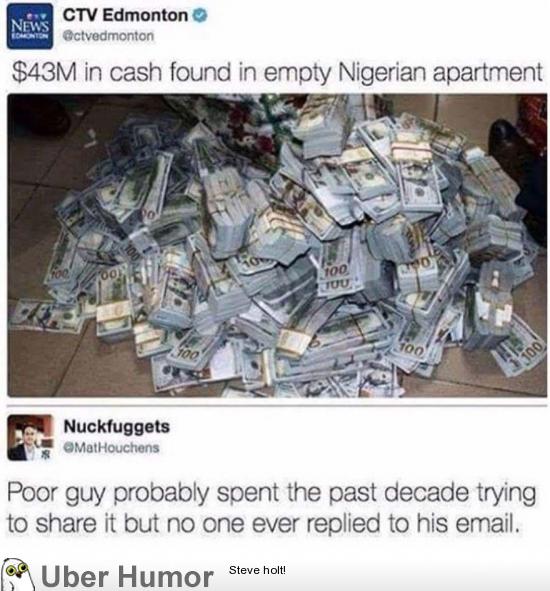When the "Prince of Nigeria" email first started circulating, few could have predicted its lasting impact on internet culture. What began as a seemingly simple scam attempt has evolved into one of the most enduring and versatile memes of all time. The "Prince of Nigeria" meme has transcended its origins, becoming a cultural touchstone that continues to resonate with audiences around the world. From its humble beginnings to its current status as a meme staple, this phenomenon has captured the imagination of millions, inspiring countless iterations and adaptations.
At its core, the "Prince of Nigeria" meme represents the universal human experience of receiving unsolicited emails promising wealth and fortune. The humor lies in the absurdity of the proposition – a distant royal relative leaving behind a fortune that only you can claim. Over time, the meme has grown to encompass a wide range of scenarios, from elaborate storylines to minimalist jokes. Its adaptability and versatility have ensured its continued relevance in an ever-changing digital landscape.
The "Prince of Nigeria" meme has also sparked important discussions about online security, digital literacy, and the evolving nature of internet scams. By examining its origins and evolution, we can gain valuable insights into how memes shape our understanding of the world and influence our behavior. This article delves into the fascinating history of the "Prince of Nigeria" meme, exploring its cultural significance and impact on modern internet culture.
Read also:Ice Cube And Son Comparison A Comprehensive Analysis Of Their Careers Styles And Impact
What Exactly is the Prince of Nigeria Meme All About?
The "Prince of Nigeria" meme originates from the infamous "419" scam, named after the section of Nigeria's criminal code that addresses fraud. The scam typically involves an email from someone claiming to be a Nigerian prince or government official, seeking assistance to transfer large sums of money out of the country. In exchange, the recipient is promised a substantial portion of the funds. While the premise may seem far-fetched, the scam has proven remarkably effective, preying on people's hopes and dreams.
Over time, the "Prince of Nigeria" meme has evolved beyond its original form, incorporating elements of satire and parody. Memes often feature exaggerated versions of the original email, complete with misspellings, grammatical errors, and over-the-top promises. The humor lies in the juxtaposition of the scam's ridiculous claims with the earnest tone of the email. This transformation from a simple scam to a cultural phenomenon highlights the internet's ability to repurpose and reinvent content.
How Did the Prince of Nigeria Meme Become So Popular?
The widespread popularity of the "Prince of Nigeria" meme can be attributed to several factors. First, its simplicity makes it accessible to people of all ages and backgrounds. The basic premise of a wealthy prince seeking help resonates with universal human desires for wealth and adventure. Additionally, the meme's adaptability allows it to be used in a variety of contexts, from political satire to personal anecdotes.
Social media platforms have played a significant role in the meme's rise to prominence. Platforms like Twitter, Reddit, and Instagram provide ideal environments for meme sharing, enabling rapid dissemination of content. The "Prince of Nigeria" meme's ability to evolve and adapt to new formats has ensured its continued relevance in an ever-changing digital landscape. As new platforms emerge, the meme continues to find new audiences and applications.
Why Does the Prince of Nigeria Meme Still Matter Today?
Despite its origins in the early days of the internet, the "Prince of Nigeria" meme remains relevant today. It serves as a reminder of the importance of digital literacy and critical thinking in an age of increasingly sophisticated scams. The meme's enduring popularity also speaks to the universal appeal of humor and satire as tools for processing complex realities. By laughing at the absurdity of the scam, we can better protect ourselves from falling victim to similar schemes.
Biography of the Infamous "Prince"
| Full Name | Varies depending on the email |
|---|---|
| Title | Prince (self-proclaimed) |
| Country of Origin | Nigeria |
| Profession | Government official (claimed) |
| Notable Achievements | Inspiring one of the most enduring internet memes |
Who is Behind the Prince of Nigeria Meme?
While the identity of the original "Prince of Nigeria" remains shrouded in mystery, the meme itself has taken on a life of its own. Various iterations have emerged over the years, each featuring its own unique twist on the classic scam. Some versions attribute the emails to specific individuals, while others remain deliberately vague. This anonymity adds to the meme's allure, allowing it to transcend individual identities and become a collective cultural artifact.
Read also:How To Lighten Dyed Hair The Ultimate Guide For Safe And Effective Results
Is the Prince of Nigeria Meme Just a Harmless Joke?
While the "Prince of Nigeria" meme may seem like a harmless form of entertainment, it raises important questions about the intersection of humor and real-world consequences. On one hand, the meme serves as a valuable tool for educating people about the dangers of online scams. On the other hand, it risks trivializing the very real issues of fraud and cybercrime. Striking a balance between humor and awareness is crucial to ensuring the meme's continued relevance.
Exploring the Cultural Significance of the Prince of Nigeria Meme
The "Prince of Nigeria" meme occupies a unique space in internet culture, bridging the gap between humor and education. Its ability to address serious topics through satire has made it a valuable tool for promoting digital literacy and critical thinking. By examining the meme's origins and evolution, we can gain valuable insights into how humor shapes our understanding of complex issues.
What Makes the Prince of Nigeria Meme So Memorable?
Several factors contribute to the "Prince of Nigeria" meme's memorability. First, its simplicity makes it easy to understand and share. Second, its absurdity resonates with people's innate sense of humor, appealing to our love of the ridiculous. Finally, its adaptability allows it to remain relevant in an ever-changing digital landscape. These qualities combine to create a meme that continues to captivate audiences around the world.
How Has the Prince of Nigeria Meme Evolved Over Time?
The "Prince of Nigeria" meme has undergone significant evolution since its inception. Early versions focused on replicating the original scam emails, complete with their characteristic misspellings and grammatical errors. Over time, the meme has incorporated new elements, such as visual components and interactive formats. This evolution reflects the broader trends in internet culture, where memes increasingly incorporate multimedia elements to enhance their impact.
Understanding the Psychology Behind the Prince of Nigeria Meme
At its heart, the "Prince of Nigeria" meme taps into fundamental aspects of human psychology. It exploits our natural desire for wealth and adventure, promising easy solutions to complex problems. By understanding the psychological mechanisms at play, we can better appreciate why the meme resonates so strongly with audiences. This knowledge can also help us develop strategies for combating similar scams in the future.
What Can We Learn From the Prince of Nigeria Meme?
The "Prince of Nigeria" meme offers valuable lessons about the nature of humor and its role in shaping our understanding of the world. It demonstrates the power of satire to address serious topics in an accessible and engaging way. Additionally, it highlights the importance of digital literacy in an age of increasingly sophisticated scams. By studying the meme's impact, we can gain insights into how humor influences our behavior and decision-making.
Why Should You Care About the Prince of Nigeria Meme?
While the "Prince of Nigeria" meme may seem like just another internet joke, it has significant implications for how we approach online security and digital literacy. By understanding its origins and evolution, we can better protect ourselves from falling victim to similar scams. Furthermore, the meme serves as a reminder of the power of humor to shape our perceptions and influence our actions. In an increasingly digital world, these lessons are more important than ever.
Conclusion: The Enduring Legacy of the Prince of Nigeria Meme
The "Prince of Nigeria" meme has left an indelible mark on internet culture, shaping how we think about humor, satire, and digital literacy. Its ability to adapt and evolve ensures its continued relevance in an ever-changing digital landscape. As we move forward into an increasingly interconnected world, the lessons of the "Prince of Nigeria" meme will remain relevant for generations to come. By embracing its humor while remaining vigilant against its real-world counterparts, we can navigate the complexities of the digital age with greater confidence and understanding.
Table of Contents
- What Exactly is the Prince of Nigeria Meme All About?
- How Did the Prince of Nigeria Meme Become So Popular?
- Why Does the Prince of Nigeria Meme Still Matter Today?
- Biography of the Infamous "Prince"
- Who is Behind the Prince of Nigeria Meme?
- Is the Prince of Nigeria Meme Just a Harmless Joke?
- Exploring the Cultural Significance of the Prince of Nigeria Meme
- What Makes the Prince of Nigeria Meme So Memorable?
- How Has the Prince of Nigeria Meme Evolved Over Time?
- Understanding the Psychology Behind the Prince of Nigeria Meme


